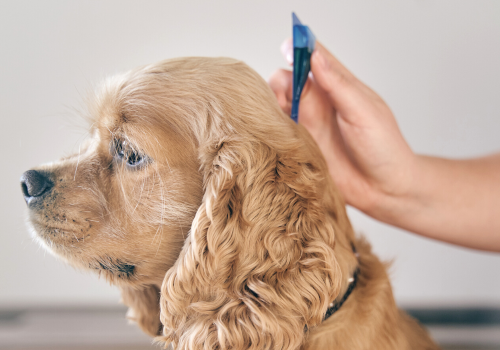We’ve all been there. Your dog is itching an abnormal amount, and you’re not sure if it’s allergies or a dreaded flea and/or tick infestation. None of it is fun, but it’s essential to get to the bottom of it quickly to get your dog some relief. That’s likely why you ended up online and, despite your best intentions, “Dr. Google” is not going to be your most trusted reference. Perhaps you’ve let the preventive medicines lapse, and you’ve noticed what’s called flea dirt on your dog or, worse, you’ve seen what you think is a tick attached to them. Call your veterinarian to get the help you need, but you can also read on for information you can trust. To circumvent the misinformation you can find online, we’ve answered frequently asked questions on dog fleas and ticks.
While the information provided by us at Burl-Moor-Driben Animal Hospital below is accurate, we’d like to reiterate that it’s always best to talk to your own veterinarian. If your dog needs a veterinarian in or around the South Jersey/Philly Area, we’d be thrilled to get your dog on the necessary preventative medications. Give us a call at (856) 409-7179 today to schedule an appointment.
How does my dog get fleas and ticks?
The places where these fleas reside are nearly endless, from a neighbor’s home and boarding facilities to dog parks and your local groomers. So if your dog is not protected against fleas, there are unfortunately many possibilities for them to be able to pick up fleas or even for other pets, animals, and people to introduce them into your home.
Ticks, on the other hand, start outdoors typically in tall grasses. So if you live near fields, perhaps on the edge of woods, you’re in an area where you will see ticks, and your dog can pick them up when they run through. You need to be hypervigilant about your flea and tick protection and check your dog for ticks every time they come inside.
Common Misconceptions
It is a common misperception that an indoor pet can't have fleas or ticks, if perhaps you live on the second-story floor of an apartment in the city or don't go outside at all. The dog still needs to go out for walks or, at the very least, to go to the bathroom. We can also bring fleas and ticks into them, and fleas are sometimes found on decks and porches. Also, if you have a cat that goes outside, they can bring fleas into your environment and onto your dog.
Another misconception is that your dog doesn’t need year-round flea and tick prevention. As we get closer to the winter months most fleas and ticks seek shelter in warmer environments, like your homes. Also, the winter months aren't as cold as they used to be, so we are seeing fleas and ticks most of the year now. For these reasons we recommend year-round protection.
Can fleas and ticks spread from my dog to my home and family?
Yes, they can. Fleas like to hitchhike on shoes, clothes, or belongings. It’s also essential to understand the life cycle of fleas in that only one to five percent of the adults are on your dog, and 95% are in your home. Fleas only spend their adult time on the dog. Then, they leave the dog to lay their eggs and have their younger life stages out of the environment. So they certainly can affect you and other pets in your household. Ticks can also get on humans and potentially spread tick-borne diseases.

What health problems can fleas and ticks cause my dog?
Fleas are notorious for causing severe itching and skin issues in dogs. Some dogs are allergic to flea saliva, so they have an extreme reaction. Fleas also digest your dog's blood, so if there's a bad enough infestation, it can cause anemia and affect your dog’s blood levels. This can be very dangerous, especially in puppies.
Ticks can transmit many different diseases. One of the most well-known tick-borne illnesses is Lyme Disease, which both humans and animals can get.
Some other flea and tick-borne diseases include:
- Tapeworms
- Rocky Mountain Spotted Fever
- Ehrlichiosis
- Anaplasmosis
- Hepatozoonosis
- Bartonellosis
These diseases can cause a variety of issues, such as:
- The destruction of blood cells
- Fever
- Joint issues
- Kidney issues
- And a whole host of other problems
What will my veterinarian recommend for flea and tick treatment?
Your veterinarian will likely recommend a state-of-the-art oral combination that will also be a preventive, or they will suggest a topical preventive. You’ll administer them for at least 3 months and we know they will begin to kill fleas within minutes to hours. You’ll also want to both vacuum your house and wash loose linens/pet beds frequently during this time to kill eggs, larvae, and pupae. We'll talk about your lifestyle and what will be easiest for you, which often means an all-in-one flea, tick, heartworm, and gastrointestinal parasite prevention.

What is the difference between over-the-counter and prescription flea and tick medications?
The FDA-approved, EPA-regulated products that you get from your veterinarian work better and haven’t developed the resistance that many of the older, OTC products have. We know a lot more about the preventives we give you and can help you understand when to use them and what to expect as far as the results.
Although there are some topicals and collars available over the counter that are somewhat reputable, the ones we give you are more based in medicine. Also, the less reputable ones are basically pesticides, so they're not as safe. You can always ask your veterinarian which product is best for your dog.
What should I do if I see fleas or ticks on my dog?
Call your veterinarian, and as they know your dog's age and your circumstances, they’ll be able to walk you through how to best treat them and what products to use.
The American Veterinary Medical Association (AVMA) and American Animal Hospital Association (AAHA) also offer a comprehensive guide to dog flea and tick prevention. At Burl-Moor-Driben Animal Hospital, your pet is our priority. We are located in Moorestown, NJ, so if you have any questions, don't hesitate to call our team at (856) 409-7179, or you can email us at [email protected]. Our staff would love to talk with you!
Don't forget to follow us on social media: Facebook, Instagram.

